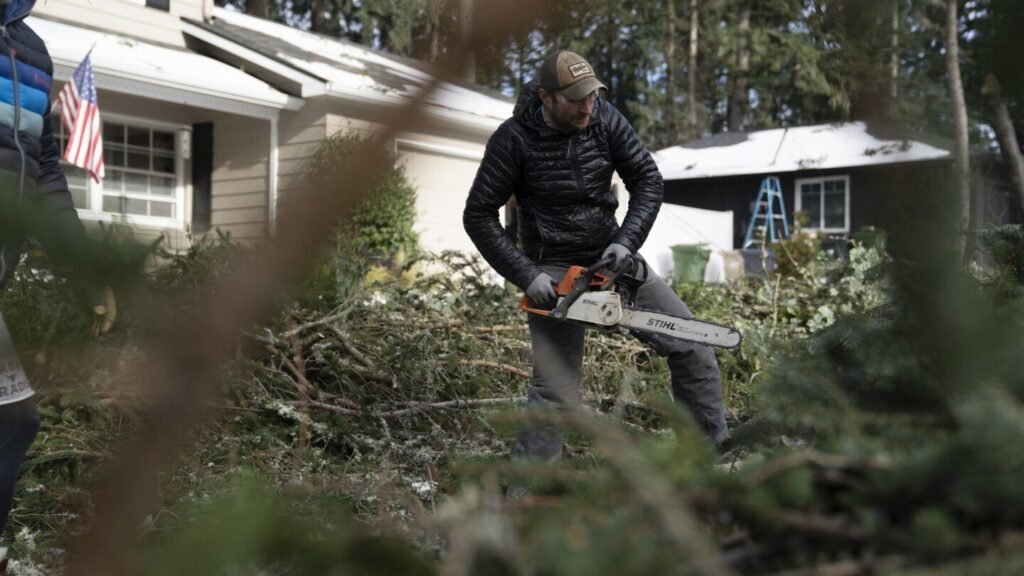PORTLAND, Ore. (news agencies) — The Pacific Northwest was bracing for freezing rain and ice Tuesday even as tens of thousands of residents struggled with a dayslong power outage wrought by a weekend storm that was blamed for at least seven deaths.
Freezing rain was forecast in the Seattle area, and parts of southwest Washington and western Oregon — including the state’s largest cities of Portland, Salem and Eugene — were under an ice storm warning, with meteorologists expecting up to half an inch of ice through early Wednesday. Warmer air was expected to provide some relief starting later Wednesday.
While the Pacific Northwest is more known for rain and wasn’t set to experience the Arctic temperatures or significant snowfall blanketing other parts of the U.S., the heavily forested region is especially prone to the danger of falling trees and power lines, particularly during freezing rain and ice storms.
Freezing rain falls as water but freezes when it hits roads and other cold surfaces. It can weigh down trees and power lines, making them heavier and likelier to snap, especially in strong winds. Previous ice storms in 2017 and 2021 paralyzed the area and left hundreds of thousands without power.
Oregon transportation officials closed 47 miles (76 kilometers) of Interstate 84, a major east-west highway that runs from Portland through the Columbia River Gorge, because of the icy forecast.
“Ice accumulation creates some of the most treacherous driving conditions, and the Interstate is being closed to keep everyone safe. We will reopen when conditions improve,” the Oregon Department of Transportation said in a news release.
Weekend weather that included snow and strong winds was blamed for at least seven deaths, including that of a man killed when a tree struck his house in Lake Oswego, a suburb south of Portland, and a woman who died when a tree crushed a recreational vehicle in Portland, trapping her and causing a fire, authorities said.
“We’re lucky to be alive,” said Lake Oswego resident Justin Brooks, as he used a chainsaw Tuesday to cut up the trunks of two massive trees that narrowly missed his home when they fell on Saturday.
Elsewhere in Lake Oswego on Tuesday, arborist Ryan Cafferky scaled a towering 150-foot (46-meter) tree to start the laborious process of cutting it down. The city had deemed the 120-year-old tree a threat to the public because it was at risk of falling, he said.
Carol Flannery watched as Cafferky, clipped into a harness, worked to remove the massive tree from her property. In addition to its old age, cracking and fungus around its roots also made it dangerously susceptible to tipping, she said.
She said arborists told her that “we gotta get this out quick, because it’s gonna go.”
Five people in Oregon were believed to have died of hypothermia in temperatures that hovered in the teens and 20s, authorities said.
As of midday Tuesday, about 52,000 people in Oregon still remained without power, according to poweroutage.us, which tracks utility outage reports. The National Weather Service warned residents to prepare for more power outages.
The ice storm forecast prompted Portland Public Schools, the largest district in the state, to cancel classes Tuesday and Wednesday. It amounted to additional missed days of in-person learning for students following a teachers strike in November that shut down schools for roughly three weeks.
Courts, libraries and parks were also closed in Portland and other parts of Multnomah County.
County officials extended a weather state of emergency until noon Wednesday and decided to keep a record 12 overnight emergency weather shelters open for an additional night Tuesday. The county said 1,181 people slept in the shelters Monday night, breaking the previous night’s record of 1,136.
Officials issued an urgent call for volunteers, citing the high demand for shelter services in an area where thousands of people live outside at risk of cold exposure.
“The real limitation for us right now is staffing,” said Dan Field, director of the joint county-city homelessness office. “We have to have enough people to keep the doors open of the emergency shelters.”
media journalist Jennifer Kane in Lake Oswego, Oregon, contributed to this report.


